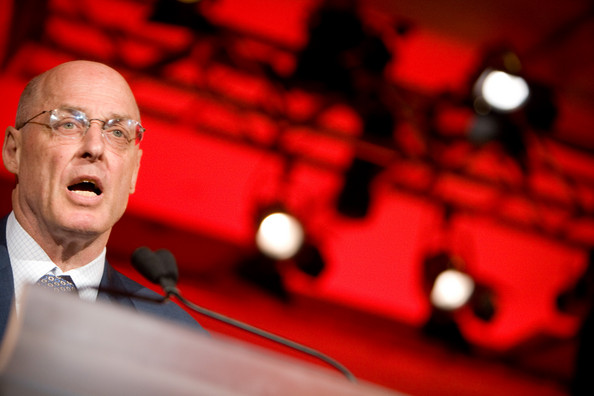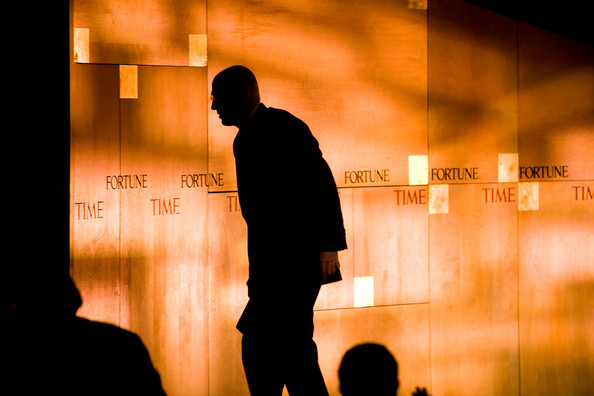The Hammer's reputation restoration tour has begun. Broadcast yesterday morning on CBS Sunday Morning, Hank talks about his tenure as Treasury Secretary, bank bailouts, and a regulatory system that's 'still very sick.'
The reporter doesn't mention that Paulson is singularly responsible for the SEC decision in 2004 that exempted Goldman Sachs and the other 4 large investment banks from previous limits on leverage. Seems a rather salient detail to conveniently leave out of the interview.
The immense value of these clips will become apparent as you watch Paulson stutters his way through difficult answers. No miss.
-----
Video: Former Treasury Secretary Henry Paulson talks with Anthony Mason about how the U.S. came close to an unemployment rate of 25 percent -- Runs 1 minute -- 1/31/10
-----
Video: Paulson on paying huge bank bonuses -- Runs 1 minute
This clip is priceless as you play along while the Hammer stutters his way through an answer.
-----
Comment from Benny:
F you Henry Paulson. Every day I pray someone prosecutes this criminal for destroying our Country. He allowed criminal enterprises like Goldman Sachs, JPMorgan, Bank of America and Citi to earn disgusting bonuses from bogus transactions. And when it was revealed the transactions were make believe, he dumped their debts onto people who work and save their money. I hate you Henry Paulson.
-----
Video: Paulson on 'calculated risks' -- complete interview -- January 31, 2010
---
Transcript courtesy of CBS News >>
Seventy-five men have served as Treasury Secretary of the United States. Few have had the impact of Henry Merritt Paulson, Jr.
In 2008, as the global economy teetered on a precipice, he became the face of the financial crisis and he was still answering for his decisions at a hearing on Capitol Hill last week.
Paulson left the Treasury last January after a turbulent two-and-a-half-year tenure.
"When I walked out, in some ways I was ready to go," he said. "We did things that were unpopular at the time, are even more unpopular today as the public has gotten angry."
In his first television interview since stepping down, he acknowledged history is judging him harshly.
"And do you think that anger is justified?" Mason asked.
"I tell you I understand that anger," Paulson said.
The crisis tested Paulson. A prince of Wall Street and ardent defender of free markets, he became perhaps the biggest government interventionist of modern times. "King Henry" became the "Bailout King."
"Did you find yourself sort of wrestling with your economic and political philosophy?" Mason asked.
"I didn't have to wrestle," he replied. "I didn't think a lot about theory. I just understood how bad it could be. And so I just felt like I was racing against time with inadequate tools and authorities, to try to stave off disaster."
Critics have accused him of "lurching from crisis to crisis": Paulson has spent the past year answering them, writing a book he calls "On the Brink" (Hachette Book Group).
"I believe that if the system collapsed, we easily could have seen unemployment of 25%," Paulson said. "And so that reality was staring me in the face, and it was an awful reality."
"How close in your view did we come to that?"
"Oh, I think we came very, very close."
When President Bush tapped the Goldman Sachs CEO to become Treasury Secretary, he chose a straight-talking deal maker who has never liked playing defense.
An all-Ivy tackle for Dartmouth in the 1960s, "Hammering Hank" was known for his aggressive play.
"Who first gave you the nickname the Hammer?" Mason.
"I don't remember," Paulson said, who admitted, "It stuck."
After college, Paulson landed a job in the Pentagon and was assigned to help the failing Lockheed Corporation.
"It's rather ironic, I got some early bailout experience," he said.
He moved over to the Nixon White House for a year and a half, before rising up the ranks of the powerhouse Wall Street investment bank Goldman Sachs.
When he left the company to become Treasury Secretary, he sold his stock for nearly half a billion dollars.
But Paulson and his wife Wendy, who are avid environmentalists, have never liked the flashy New York lifestyle.
"I grew up on, actually, a farm not far from here, through sixth grade," Paulson said. "And then we sold the farm and moved here."
His mother still lives in that house in Barrington, Ill., outside Chicago. In the Seventies, the Paulsons built a house next door on land they bought from his parents.
"Gave 'em a note because I didn't have any money to buy it with, and we paid it off over time," he said.
They planned to move back here after he left Wall Street, but then the president called.
"You probably figured it was going to be a couple of quiet years in Washington?" Mason asked.
"It's never a couple of quiet years with Hank," replied Wendy Paulson.
Unwittingly, Paulson walked into an economic earthquake - first the rescue of Bear Stearns, then the takeover of Fannie Mae and Freddie Mac.

When he took the first steps toward the ultimate seizure of the mortgage giants on a July Sunday outside the Treasury, he thought he had contained the crisis:
"That was the time I was perhaps most hopeful," he said. "I remember going out on the steps and we were racing to beat a thunderstorm."
"As it turned out that's exactly what you were doing," said Mason.
"That's exactly right!"
Within weeks, Lehman Brothers, the 157-year-old investment bank was on the brink of collapse. Holed up on the 13th floor of the New York Federal Reserve with Timothy Geithner, Paulson worked the phones to find a buyer, but failed.
"My stomach tightened up and it was one of those times during the crisis where I was momentarily overcome by fear," Paulson said.
A Christian Scientist, Paulson called home to his wife Wendy:
"And I said, 'Everybody's going to be looking to me for answers, and I don't have any. Please help me, pray for me.' But boy, that was, that was a dark, dark hour."
It would get darker.
When Lehman went under the next day, the stock market plunged more than 500 points. It didn't help that Paulson implied he'd been unwilling to save Lehman: at a press conference he said, "I never once considered that it was appropriate to put taxpayer money on the line."
"You took a lot of heat for the outcome of Lehman," said Mason. "The French Finance Minister called it horrendous."
"These critics look and say, 'Well, look at Bear Stearns, look at AIG, why not Lehman?'" Paulson said. "But the fact, the situation at Lehman was very different. No human being could have worked any harder than I did for a long period of time to help Lehman Brothers."
Paulson insists that without a buyer, the government had no authority to help save Lehman.
The crisis was wearing on the Treasury chief, and when Paulson grew exhausted he was prone to an embarrassing condition: the dry heaves.
"Were you concerned that if people saw you . . . ?" Mason.
"Oh absolutely," he said. "I knew I was fine, but for someone to see the Treasury Secretary doubled over with the dry heaves! They heard it once."
"How do you explain that?"
"I didn't explain it. I just kept goin'."
This past week, Paulson was asked to explain his role in the controversial AIG rescue. Billions pumped into the collapsing insurance giant was used to pay off banks in full - including Paulson's former company Goldman Sachs, now run by Lloyd Blankfein.
"Some have suggested that you had a special interest in protecting Goldman," Mason said.
"When I became Treasury Secretary, I sold my Goldman Sachs stock. I severed my relationship with Goldman Sachs. My responsibility was to the American people."
"And you spoke to Lloyd Blankfein 24 times in 6 days. Why?"
"Well, first of all I doubt I spoke with Lloyd Blankfein 24 times in 6 days ..."
The phone records say he did.
But they also show he talked constantly with Wall Street executives, he says to keep track of the markets.
Many will remember him only as the man who bailed out the banks:
"And I will tell you right now and tell the American people, they're not going to lose a dime on the money that we put in those banks."
History may prove him right. Most of the major banks have already paid back the TARP money, with interest. They're also paying themselves billions in bonuses again.
"If you were back running a bank today, would you be paying the kind of bonuses that are being paid on Wall Street?" Mason asked.
"I think some of these numbers seem ridiculously high," Paulson said.
A year after he left the Treasury, Paulson says not enough has changed.
"Is the patient still sick?" Mason asked.
"The patient is stable and recovering if the patient is the banking system," Paulson said. "But if the patient is the regulatory system, that patient is still very sick."
But Hank Paulson is not the doctor anymore. He is now visiting scholar at Johns Hopkins University in Washington, teaching classes, and at 63, considering his next step.
"You said, I think, that you didn't want to be Treasury Secretary just to be Treasury Secretary -
you wanted to have an impact," Mason said.
"That's for sure, yes."
"You did have an impact."
"I did have an impact, although I would have settled for having a much smaller impact," Paulson said.
---
